中考英语全国通用版二轮专项复习 代词(共68张PPT)
文档属性
| 名称 | 中考英语全国通用版二轮专项复习 代词(共68张PPT) |  | |
| 格式 | pptx | ||
| 文件大小 | 1.4MB | ||
| 资源类型 | 教案 | ||
| 版本资源 | 通用版 | ||
| 科目 | 英语 | ||
| 更新时间 | 2023-06-22 21:36:45 | ||
图片预览

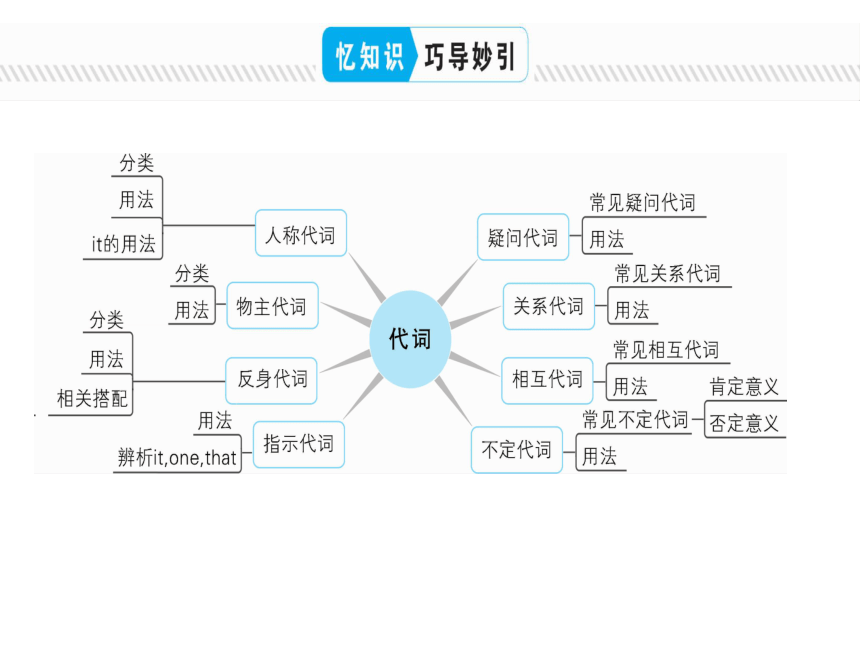
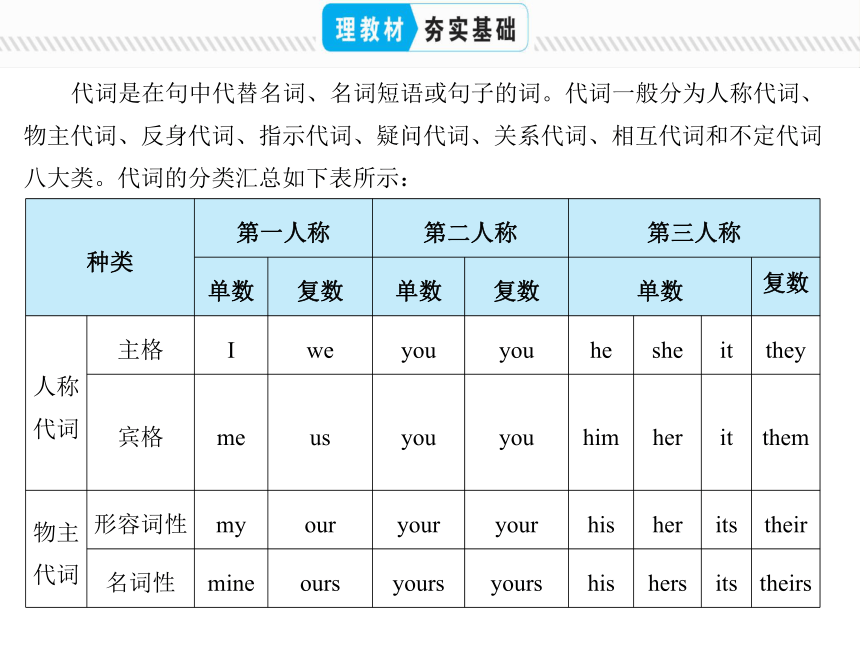
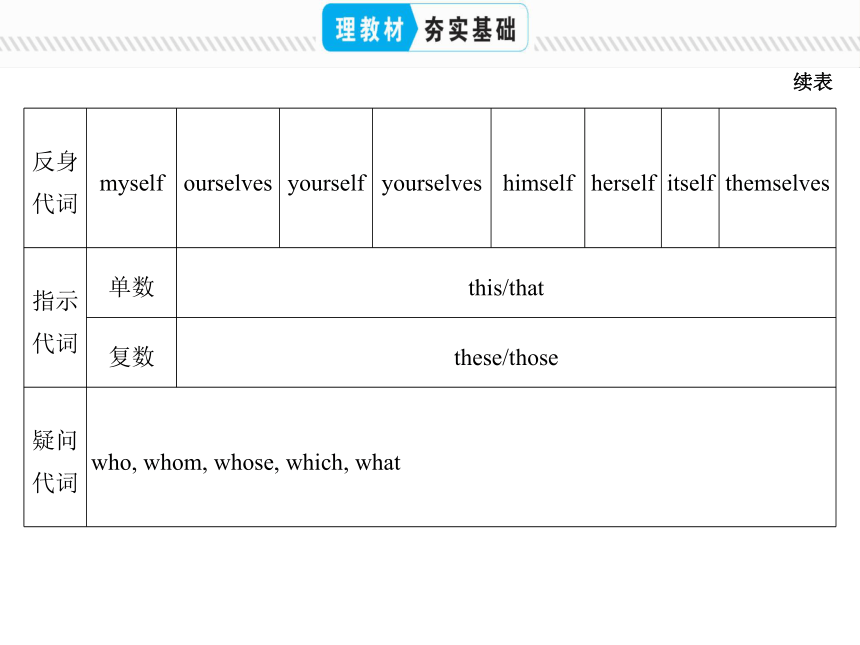
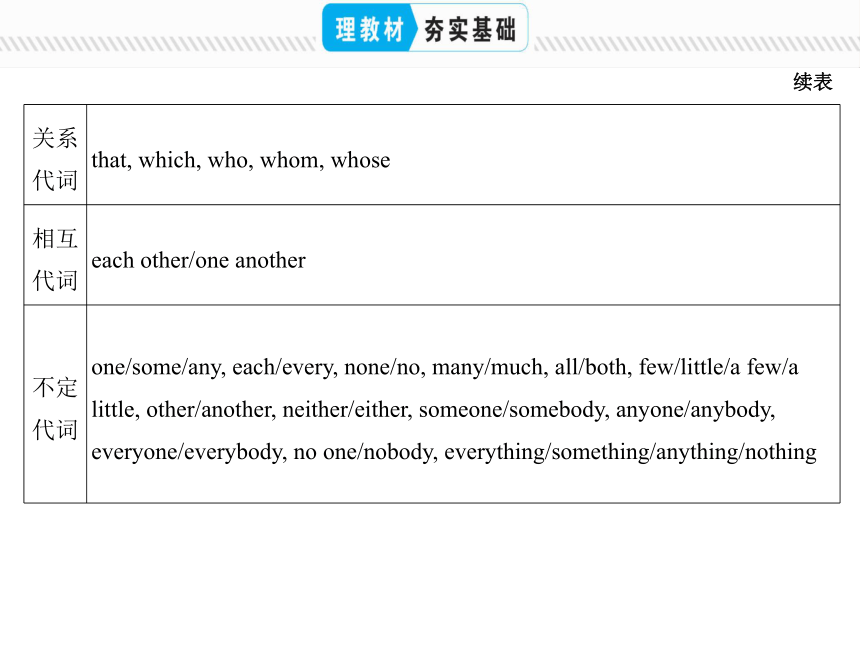
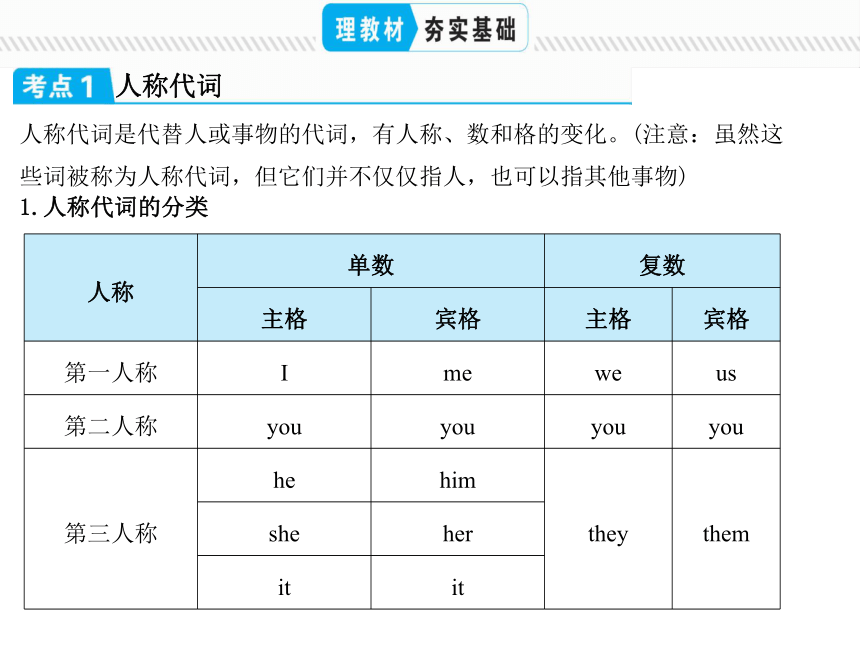
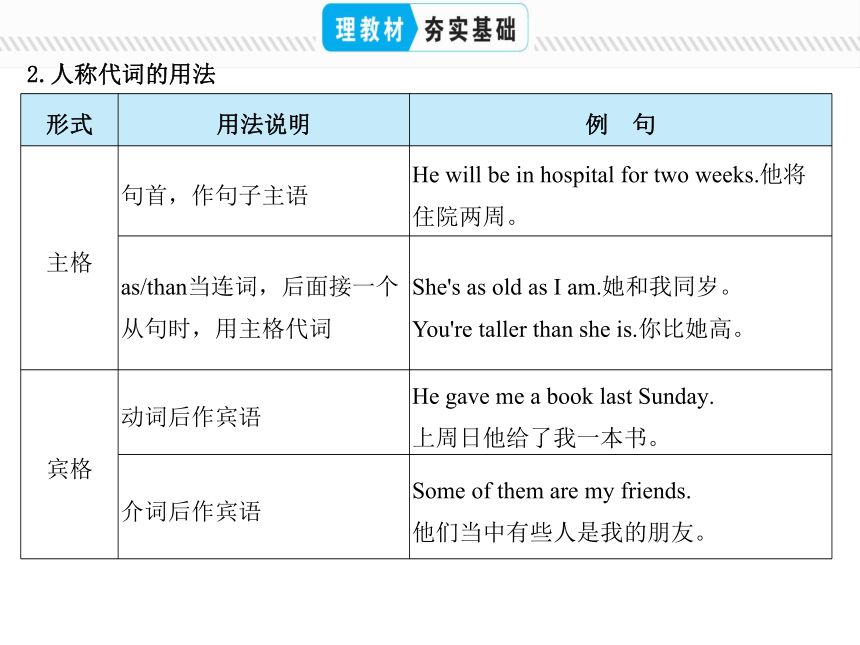
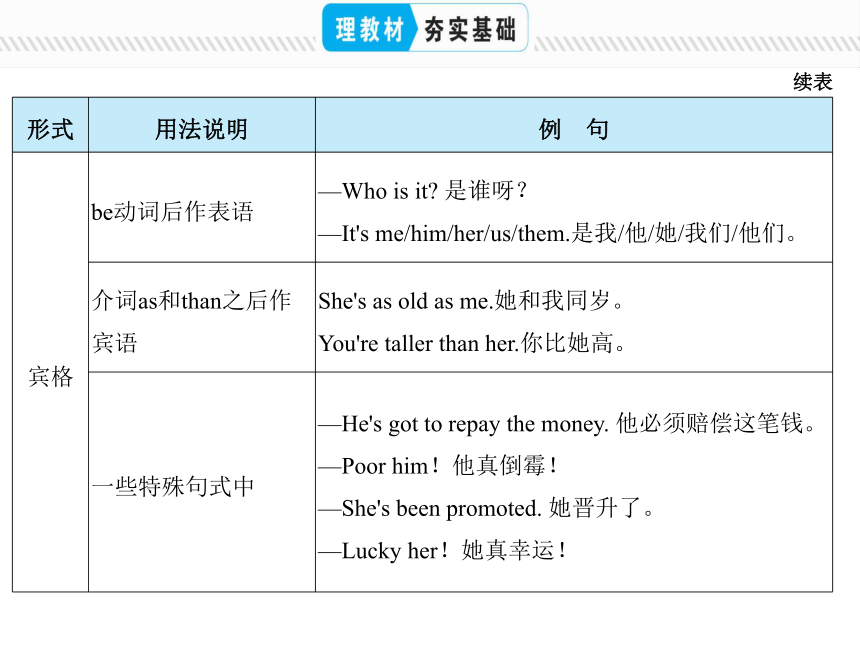
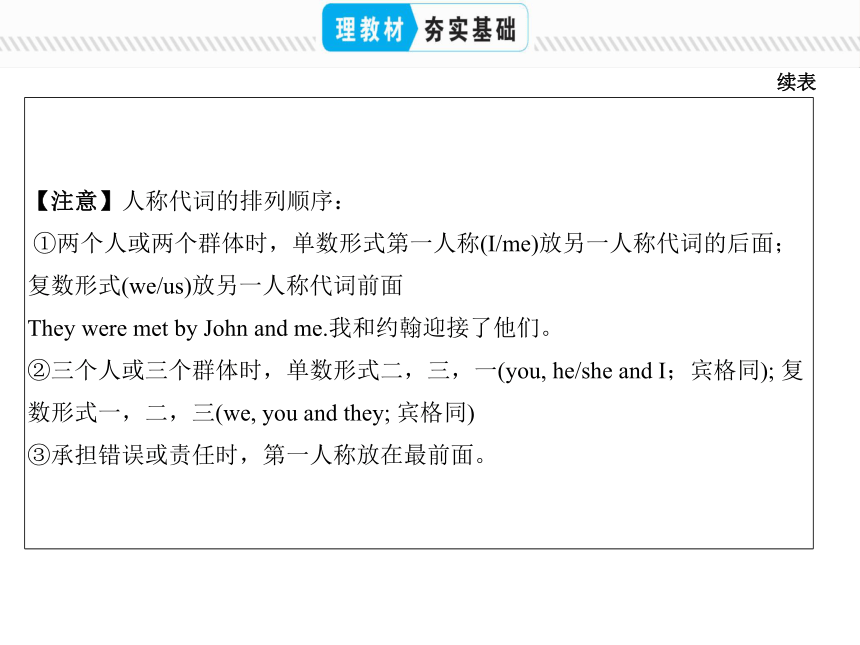
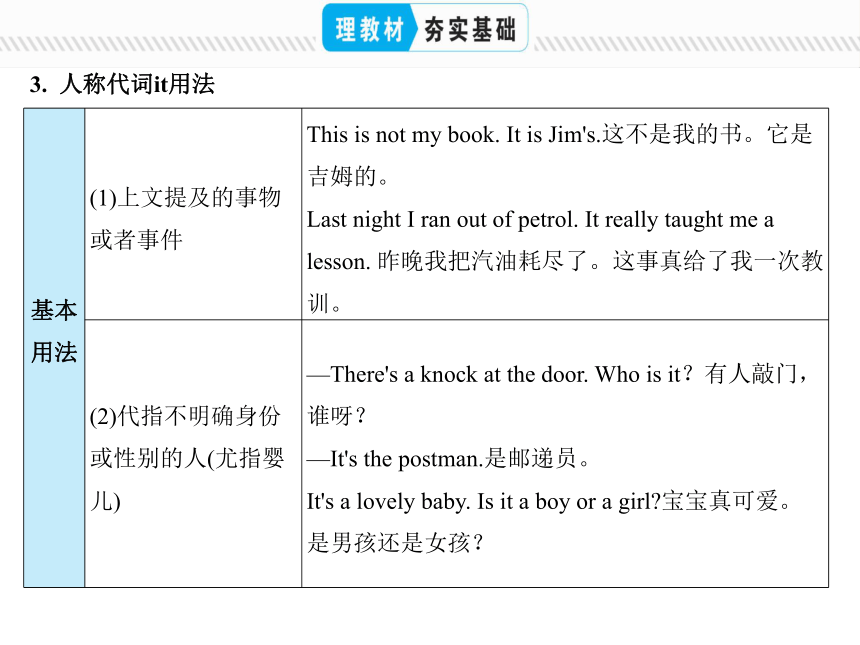
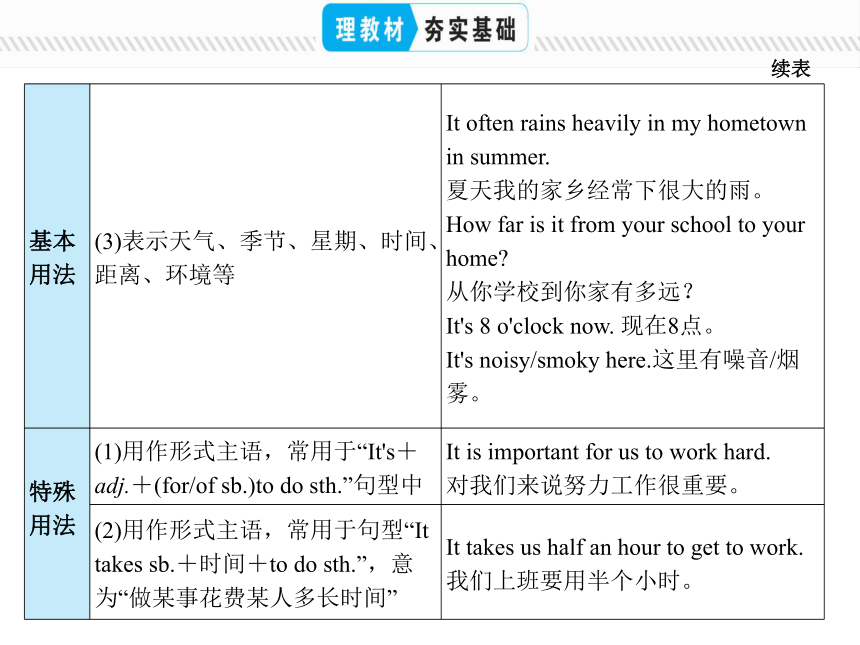
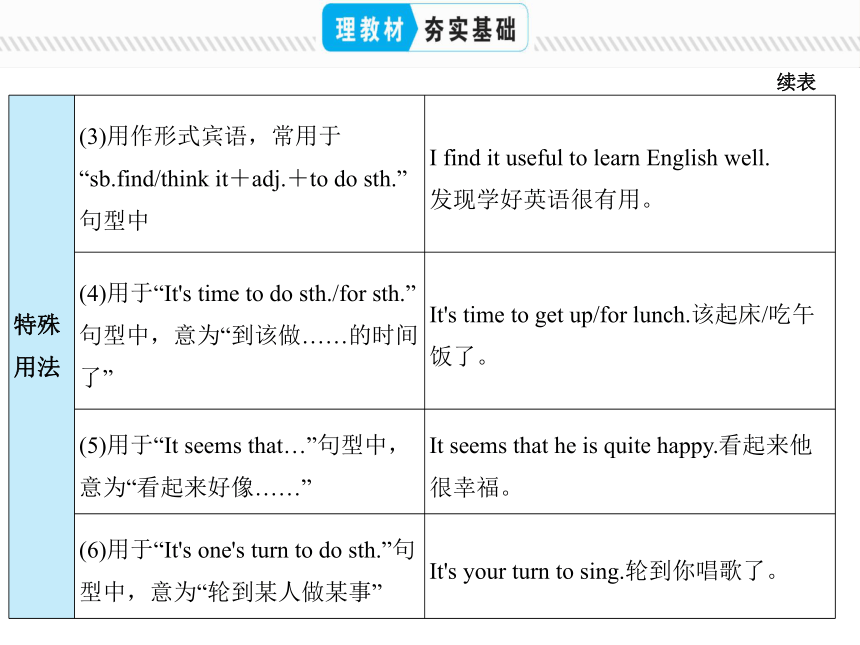
文档简介
(共68张PPT)
第 3讲 代 词
忆知识●巧导妙引
理教材●夯实基础
练好题●夯基提能
种类 第一人称 第二人称 第三人称 单数 复数 单数 复数 单数 复数
人称 代词 主格 I we you you he she it they
宾格 me us you you him her it them
物主 代词 形容词性 my our your your his her its their
名词性 mine ours yours yours his hers its theirs
代词是在句中代替名词、名词短语或句子的词。代词一般分为人称代词、物主代词、反身代词、指示代词、疑问代词、关系代词、相互代词和不定代词八大类。代词的分类汇总如下表所示:
反身代词 myself ourselves yourself yourselves himself herself itself themselves
指示代词 单数 this/that 复数 these/those 疑问代词 who, whom, whose, which, what 续表
关系代词 that, which, who, whom, whose
相互代词 each other/one another
不定代词 one/some/any, each/every, none/no, many/much, all/both, few/little/a few/a little, other/another, neither/either, someone/somebody, anyone/anybody, everyone/everybody, no one/nobody, everything/something/anything/nothing
续表
人称代词
人称代词是代替人或事物的代词,有人称、数和格的变化。(注意:虽然这些词被称为人称代词,但它们并不仅仅指人,也可以指其他事物)
1.人称代词的分类
人称 单数 复数 主格 宾格 主格 宾格
第一人称 I me we us
第二人称 you you you you
第三人称 he him they them
she her it it 2.人称代词的用法
形式 用法说明 例 句
主格 句首,作句子主语 He will be in hospital for two weeks.他将住院两周。
as/than当连词,后面接一个从句时,用主格代词 She's as old as I am.她和我同岁。
You're taller than she is.你比她高。
宾格 动词后作宾语 He gave me a book last Sunday.
上周日他给了我一本书。
介词后作宾语 Some of them are my friends.
他们当中有些人是我的朋友。
形式 用法说明 例 句
宾格 be动词后作表语 —Who is it 是谁呀?
—It's me/him/her/us/them.是我/他/她/我们/他们。
介词as和than之后作宾语 She's as old as me.她和我同岁。
You're taller than her.你比她高。
一些特殊句式中 —He's got to repay the money. 他必须赔偿这笔钱。
—Poor him!他真倒霉!
—She's been promoted. 她晋升了。
—Lucky her!她真幸运!
续表
【注意】人称代词的排列顺序:
①两个人或两个群体时,单数形式第一人称(I/me)放另一人称代词的后面;复数形式(we/us)放另一人称代词前面
They were met by John and me.我和约翰迎接了他们。
②三个人或三个群体时,单数形式二,三,一(you, he/she and I;宾格同); 复数形式一,二,三(we, you and they; 宾格同)
③承担错误或责任时,第一人称放在最前面。
续表
3. 人称代词it用法
基本 用法 (1)上文提及的事物或者事件 This is not my book. It is Jim's.这不是我的书。它是吉姆的。
Last night I ran out of petrol. It really taught me a lesson. 昨晚我把汽油耗尽了。这事真给了我一次教训。
(2)代指不明确身份或性别的人(尤指婴儿) —There's a knock at the door. Who is it?有人敲门,谁呀?
—It's the postman.是邮递员。
It's a lovely baby. Is it a boy or a girl 宝宝真可爱。是男孩还是女孩?
续表
基本用法 (3)表示天气、季节、星期、时间、距离、环境等 It often rains heavily in my hometown in summer.
夏天我的家乡经常下很大的雨。
How far is it from your school to your home
从你学校到你家有多远?
It's 8 o'clock now. 现在8点。
It's noisy/smoky here.这里有噪音/烟雾。
特殊 用法 (1)用作形式主语,常用于“It's+adj.+(for/of sb.)to do sth.”句型中 It is important for us to work hard.
对我们来说努力工作很重要。
(2)用作形式主语,常用于句型“It takes sb.+时间+to do sth.”,意为“做某事花费某人多长时间” It takes us half an hour to get to work.
我们上班要用半个小时。
续表
特殊 用法 (3)用作形式宾语,常用于“sb.find/think it+adj.+to do sth.”句型中 I find it useful to learn English well.
发现学好英语很有用。
(4)用于“It's time to do sth./for sth.”句型中,意为“到该做……的时间了” It's time to get up/for lunch.该起床/吃午饭了。
(5)用于“It seems that…”句型中,意为“看起来好像……” It seems that he is quite happy.看起来他很幸福。
(6)用于“It's one's turn to do sth.”句型中,意为“轮到某人做某事” It's your turn to sing.轮到你唱歌了。
续表
特殊 用法 (7)用于“It's+adj.+that从句”句型中 It's necessary that you should be present at the meeting.
你应当出席会议,那是很有必要的。
(8)构成强调句型“It is/was+被强调部分+that/who+其他成分” It was on that cold night that we saw an exciting film.
就是在那个寒冷的夜晚我们看了一场激动人心的电影。
(9)与since连用 It's three years since we last met.
自从我们上次见面已经有三年了。
(10)与says连用,或用于“It is said that…”句型中,意为“据说……” It says here there was a big fire in Hove.
听说霍夫有过一场大火。
物主代词顾名思义指物的主人,表所属关系。英语中物主代词有形容词性物主代词和名词性物主代词之分。
1. 物主代词的分类
人称 单数 复数 形容词性物主代词 名词性物主代词 形容词性物主代词 名词性物主代词
第一人称 my mine our ours
第二人称 your yours your yours
第三人称 his/her/its his/hers/its their theirs
物主代词
【注意】its一般只用作形容词性物主代词,不作名词性物主代词,its与it's不可混淆。it's=it is/it has。
类别 用法 作用 例句
形容词性物主代词 有形容词的性质,修饰名词 作定语 Our classroom is very bright.
我们的教室很明亮。
【注意】当名词前有形容词性物主代词修饰时,不可以再用a,an,the, this, that等词来修饰。比如:我的一本书my book,前面不可以再加a。 2. 物主代词的用法
类别 用法 作用 例句
名词性物主代词 有名词的性质,不能再修饰名词 作主语 His bike is new,but mine is old.
他的自行车是新的,
可我的是旧的。
作宾语 I've finished my homework. Have you finished yours?我已经做完了我的家庭作业。你的做完了吗?
作表语 This shirt is hers. 这件衬衫是她的。
与of连用 作定语 The red hat of hers is beautiful.她那顶红色的帽子很漂亮。
【注意】形容词性物主代词+名词=名词性物主代词。 举例: This is my bag.=This bag is mine. 2. 物主代词的用法
反身代词
反身代词表示动作行为反射到行为执行者本身。当一个句子中主语和宾语为同一人时,动词后的宾语应用反身代词;另外反身代词也用于一些固定搭配和系动词之后。
1. 反身代词的分类
人称 代词 反身代词 人称 代词 反身代词
单数 第一人称 myself 复数 第一人称 ourselves
第二人称 yourself 第二人称 yourselves
第三人称 himself/herself/itself 第三人称 themselves
2. 反身代词的用法
用 法 位 置 例 句
作宾语 当主语和宾语为同一人时,动词后用反身代词 常用动词: blame(责备), cut(割破), dress(穿衣), enjoy(享受), hurt(伤害), introduce(介绍)。
We enjoyed ourselves in the park.
我们在公园里玩得很愉快。
I cut myself shaving this morning.
我今天早上刮破了脸。
Polly's nearly learned how to dress herself now.
现在波利已差不多学会自己穿衣服了。
Please behave (yourself)! 请你放规矩点!
用 法 位 置 例 句
介词后作宾语 Look after yourself!你要照顾好你自己呀!
作表语 be动词和其他系动词后,用来表示感觉,情绪和状态 Don't worry about me. I will be myself at once.
不用担心我。我很快就会好起来。
I don't feel myself today. 我今天不太舒服。
作同位语 名词、代词之后或句末,表示强调,意为“某人亲自” I myself did it.=I did it myself.我自己做的。
续表
反身代词的相关搭配
dress oneself 自己穿衣服 by oneself 单独地,独自地 help oneself (to) 自用(食物等) talk/speak to oneself 自言自语
teach oneself 自学 enjoy oneself 玩得愉快
learn by oneself 自学 lose oneself 失去自我
prove oneself 证明自己 hurt oneself 伤害自己
for oneself 为了自己 come to oneself 恢复,苏醒
devote oneself (to) 献身于 keep something to oneself 保密
make yourself at home 别客气 Don't upset yourself. 别自寻烦恼。
make yourself heard 使你的话被人听得见
指示代词
指示代词是用来指定或确认某人或某事物的代词。指示代词有this,that,these,those,它们的用法如下表所示:
指示代词 用 法 例 句
this (单数) these (复数) 指在空间/时间上较近的事物 This is a map of China and that is a map of world.
这是一张中国地图,那是一张世界地图。
I like these books better than those.
比起那些书,我更喜欢这些书。
I’ll see you this afternoon. 今天下午见。
指示代词 用 法 例 句
that (单数) those (复数) 指在空间/时间上较远的事物 I saw him that day. 我那天看见他了。
These days life is easier for old people.
如今老人们的生活更好了。
I was born in 1935. In those days there was no TV.
我出生在1935年,那时候没有电视。
续表
指示代词 用 法 例 句
this/that 在电话用语中,称呼自己用this,称呼对方用that —Hello! Who is that?你好,请问是哪位?
—Hello! This is Bob speaking. 你好,我是鲍勃。
续表
指示代词 用 法 例 句
this 用于介绍人物 Amy, this is Bob. Bob, this is Amy.
艾米,这是鲍勃。鲍勃,这是艾米。
this 指下文将要提到的事物 This is how you do it. Press this button.
就这样做,按下这个按钮。
续表
指示代词 用 法 例 句
this/that 指上文已经提到过的事物 —I broke my leg. 我摔断了腿。
—When did this/that happen?这是什么时候发生的?
That's why… 这就是……的原因。
You're late. That's why we are waiting.
你迟到了。这就是我们为什么一直等着。
She lent me 50 pounds. This/That is how I got home.她借了50英镑给我,我才得以回家。
续表
指示代词 用 法 例 句
that/those 用于比较级中,代替所比较的事物,避免重复 The area of the USA is larger than that of Brazil.美国的面积比巴西的面积大。
Tom's essays are better than those of other boys.汤姆的文章比其他男孩的文章要好。
续表
辨析it, one, that
代词 用法 例句
it 特指,与上文提到的对象是同一事物 The book is mine. It's very interesting.
这本书是我的。它很有趣。
one 泛指上文提及的同类人或事物中的一个(只能代替可数名词),同类而不同物,可以指物也可以指人;复数用ones There are some pieces of bread on the plate. You can take one.盘子里有些面包。你可以拿一片。Red apples often taste better than green ones.红苹果往往比绿苹果好吃
that 特指,与上文提及的对象同类不同物,常用于比较结构中;复数用those The pen you bought is cheaper than that I bought.你买的那支笔比我买的便宜。
疑问代词
疑问代词是用来表达疑问或构成疑问句的代词,常见的疑问代词有what/which/who/whom/whose。其用法如下表所示:
疑问代词 用 法 例 句
what (指物) 意为“什么”,具有名词和形容词的性质,在句中可作主语、宾语、表语和定语 What happened (作主语)
What color do you like (作定语)
What is happiness (作表语)
What are you doing (作宾语)
疑问代词 用 法 例 句
which (指人或物) 意为“哪一个,哪一些”,具有名词和形容词的性质,在句中作主语、宾语和定语(用which提问时一般是有选择范围,而what 没有) Which train will you take (作定语)
Which do you prefer (作宾语)
Which is yours (作主语)
续表
疑问代词 用 法 例 句
who (指人) 意为“谁”,只具有名词性质,在句中作主语、表语或宾语 意为“谁”,只具有名词性质,在句中作主语、表语或宾语 Who(m) did you meet on the street 你在街上碰到了谁?
To whom did you speak on the campus 你在校园里和谁说话了?
whom (指人) 意为“谁”,只具有名词性质,在句中只能作宾语 在句中作宾语时who和whom可以互换;但在紧跟介词作宾语时只能用whom
续表
用来引导定语从句,代表先行词,同时在从句中作一定的句子成分。在定语从句中常见的关系代词有that/which/who/ whom/whose。其用法如下表所示:
关系代词 指代 作用 例句
that 指物或 指人 作主语或宾语 I like apples that are from Yantai.我喜欢烟台苹果。
The teacher that my father is talking with is Miss Gao.正在和我爸爸交谈的那个老师是高老师。
which 指物 作主语或宾语 This is the city which I visited last year.
这就是我去年参观的城市。
关系代词
关系代词 指代 作用 例句
who 指人 作主语或宾语 I don't know the man who is playing soccer.我不认识踢足球的那个男人。
whom 指人 作宾语 I want to know whom I should send the message to.我想知道把这个口信捎给谁。
whose 指人或物 作定语 This girl whose hair is yellow is my sister.这个黄毛头发女孩是我的妹妹。
注意:关系代词在定语从句中作宾语时可以省略。
续表
相互代词
相互代词表示句中动词所叙述的动作或感觉在涉及的各个对象之间是相互存在的。常见的相互代词只有each other和one another。其用法如下表所示:
相互代词 用法 例句 each other 主要用于两者之间 但在现在英语中,二者已不做区别,可通用。 Mary and Mike smiled at each other.玛丽和迈克冲彼此笑了一下。
We should respect one another.我们应该相互尊重。
one another 主要用于三者或三者以上 相互代词可加's构成所有格 They know each other's/one another's weak point.他们都彼此了解对方的缺点。
不定代词
不定代词表示不明确指代某个(些)人、某个(些)事物的代词。
1. 常见不定代词归纳
肯定意义 some/any, each/every, many/much, a few/a little, other/another, all/both, someone/somebody, anyone/anybody, everyone/everybody, everything/something/anything, either, one
否定意义 no/none/nobody/nothing/few/little/neither
2. 常见不定代词的用法
不定代词 用法 例句
some any some多用于肯定句,意为“一些”,修饰可数名词或不可数名词;也可用于表示建议或请求的疑问句中,表示说话人希望得到肯定回答 I have some questions to ask.我有一些问题要问。
—Would you like some tea?你想喝茶吗?
—Yes, I'd love to.是的,我想喝。
any多用于疑问句和否定句,意为“一些”;用于肯定句中,表示“任何一个(些),任何的”或者if 从句中,表示“一些” —Do you have any books?你有一些书吗?
—No,I don't have any books. 不,我没有书。
If you have any questions, please raise your hands.如果你有任何问题,可以举手。
each every each强调个别,可单独使用,指两者或两者以上的人或事物中的“每一个”,可与of直接连用 Each student has a pocket dictionary.
每个学生都有一本小字典。
There are many flowers on each side of the street.马路的两边有很多花。
every强调整体,不能单独使用。指三者或三者以上的人或事物中的“每一个”,不可与of直接连用 Every student has strong and weak points.
每个学生都有优点和弱点。
Every one of us has strong and weak points.我们每一个人都有优点和弱点。
续表
either both neither either指“两者中的任何一个”,作主语时谓语动词用单数, 常用于“either…or…”结构中,意为“要么……要么……”, “或者……或者……” Either of us is a doctor.我们两人都是医生。
I either play soccer or basketball after school. 我放学后要么踢足球要么打篮球。
both指“两者都”,指两个人或事物。both 可以做形容词,表示“两者都”;也可以作名词,用于“both of A and B”的结构中,表示“A和B两者都……” Both Yao Ming and Yi Jianlian played basketball in the USA.
姚明和易建联都在美国打过篮球。
Both of them are teachers. 他们两人都是老师。
neither指“两者中的任何一个都不”,作主语时谓语动词用单数 Neither of us wants to be a doctor.
我们两个都不想成为医生。
续表
all none no one all意为“所有,全部”,指三个或三个以上的人或事物 All the workers are working hard.
所有的工人都在努力工作。
none指“三者或三者以上的人或物中没有一个,一个(人/物)都没有。”一般强调数量,回答How many/much的提问 I have tried several jackets, but none of them fits me well. 我已经试了好几件夹克,但是没有一件适合我。
—How many students are there in the classroom 教室里有多少学生?
—None. 一个学生都没有。
no one指“没有人”,一般回答Who的提问 —Who is in the classroom 谁在教室?
—No one. 没人。
续表
other others other意为“其他的”,泛指,修饰可数名词或不可数名词 I like playing soccer, playing basketball and other sports.
我喜欢足球、篮球和其他运动项目。
others意为“其他人/物”,相当于“other+复数名词”;常用搭配:“some…others…”,意为“一些……其他人……” In my class, some students love music, some like drawing and others enjoy reading. 我们班上一些学生喜欢音乐,一些喜欢画画,还有一些喜欢阅读。
续表
the others the other another the others 意为“其他人/物”,加the表示特指,指确定范围内确定数目的其他人或者物 Two students in our class failed, but the others passed the exam.我们班上除两个学生考试没通过外,其他的都通过了。
the other表示“两者中的另一个”,常见搭配:“one…the other…”,意为“一个……另一个……” I have two sisters. One is a doctor, the other is a teacher.我有两个姐姐。一个是医生,另一个是老师。
another指在原来的基础上再加一个/换一个,原来的数目不确定 I don't like this shirt, please show me another one.我不喜欢这件衬衫,请给我再拿另外一件。
—How about going shopping this afternoon 今天下午去购物怎么样?
—Sorry, I am busy this afternoon. Let's make it another time.不好意思,我今天下午很忙,我们另外约个时间吧。
续表
few a few little a little few意为“几乎没有”,表否定意义;修饰可数名词 Few of us have his address.
我们当中几乎没有人知道他的地址。
a few意为“有几个;若干”,表肯定意义;修饰可数名词 There are a few apples on the tree.
这棵树上有几个苹果。
little意为“几乎没有”,表否定意义;修饰不可数名词 There is little rain here in summer.
在这里夏天几乎不下雨。
a little意为“有几个;若干”,表肯定意义;修饰不可数名词 I can speak a little English.我能说一点英语。
续表
复合不定代词
somebody某个人 anybody某人/任何人 everybody每个人 nobody没有人
something 某事 anything某事/任何事情 everything每件事 nothing没有东西
someone 某人 anyone某人/任何人 everyone每个人 no one/none没有人
【注意】复合不定代词的一些特殊用法
用 法 举 例
①复合不定代词的基本用法与some, any, no的用法相同:由some构成的复合不定代词用于肯定句、希望得到肯定回答的疑问句中;由any构成的复合不定代词用于否定和疑问句中,用于肯定句中时一般用于if从句中或any意为“任何”的肯定句中 I met someone you know last night.我昨晚碰到了一个你认识的人。
Would you like something to drink?你想要一些喝的东西吗?
Is anyone here who's a doctor?这儿有谁是医生吗?
Anyone who can solve the problem will get the money.任何能够解决这个问题的人都可以得到这笔钱。
If you have anything new to tell us, please contact the captain. 如果你有什么新的情况想告诉我,可以和船长联系。
②所有复合不定代词的谓语动词用单数形式 Everything is fine.一切都好。
用 法 举 例
③当形容词或者其他修饰性的短语来修饰复合不定代词时,形容词或这些短语需后置 原级形容词:This is something special.
这是一种特别的东西。
形容词比较级:I'd like something cheaper.
我想买点较为便宜的东西。
动词不定式:Haven't you got anything to do
你没有什么事情可干吗?
其他: We need one more helper. Could you find anyone else 我们还需要一个帮手,你能再给我们找一个吗?
续表
用 法 举 例
④在反意疑问句中,当陈述部分的主语是指人的复合不定代词,如everybody, nobody, anyone等时,疑问部分的主语通常用代词they;当 陈述部分的主语是指物的复合不定代词,如everything,anything,nothing等时,疑问部分的主语通常用代词it Everyone has read the book, haven't they 人人都读过了这本书,不是吗?
Everything is ready, isn't it
一切都已准备好,不是吗?
续表
( )1. (2019·岳阳) Yuan Longping is very creative. We all look up to ________.
A.it B. him C. her D. he
( )2. (2019·临沂)Tennis can exercise all of our muscles(肌肉). And it requires
________to spend time with others. This is good for our health too.
A. ours B. us C. we D. our
人称代词
B
【解析】考查人称代词。句意:袁隆平非常有创造力,我们都很尊敬他。这里“他”应选到代表男性的人称代词,排除答案A,C。又因为放在词组look up to介词短语后,所以应该用宾格,故选B。
B
【解析】考查人称代词。句意:网球能够锻炼我们所有的肌肉,而且它要求我们和其他人一起度过时间,这对我们的健康也是有好处的。前面提到了our, 说明说话的对象是we, 横线处所填词应该做动词require的宾语,所以应该用宾格us,故选B。
( )3. (2019·北京)Mr. Wang is coming to our school. I can't wait to see________.
A.her B. him C. it D. them
( )4. (2019·定西) Sunny's uncle is a teacher. ________ enjoys staying with
kids.
A.He B. She C. It D. I
B
【解析】考查人称代词。句意:王先生就要来我们学校了,我迫不及待地想见到他。横线处所填词应该作动词see的宾语,用宾格,另外Mr. Wang表示只有一个男生,故用him, 故选B。
A
【解析】考查人称代词。句意:Sunny的叔叔是一名老师,他喜欢和孩子们待在一起。第一句中提到Sunny的叔叔,可知应该选到代表男生的代词,又因为其在后一句中作主语,所以选到he(主格), 故选A。
( )5. (2019·滨州)—Jerry, is that boy with glasses ________ new classmate
—Yes. Let's say hello to________.
A. our, he B. us, him C. ours, his D. our, him
D
【解析】考查人称代词。句意:——杰瑞,那个戴眼镜的男孩是我们的新同学吗? ——是的,我们去和他打招呼吧。 第一空应该补充的意思为“我们的”,应选到形容词性物主代词our,修饰后面的new classmate; 第二空在介词to的后面,应该用到人称代词的宾格,应用him,故选D。
( )1. (2019·长沙) —So sorry, I took your school T shirt by mistake. But
where is ________?
—Don't worry. Let me help you find it.
A.yours B.his C.mine D. my
( )2. (2019·南京)Last month the students in Changjiang Road Primary School held the “Ten Years of Growth Ceremony” to celebrate ________ 10th birthday together.
A. they B. their C. them D. theirs
【解析】考查物主代词。句意:——实在不好意思,我错拿了你的校服T恤。但是我的校服T恤在哪里呢? ——不要着急,我来帮你找。横线处应补充的意思为“我的校服T恤”,应填入名词性物主代词,故选C。
C
B
【解析】考查物主代词。句意:上个月,长江路小学的学生们举行了“十岁成长礼”来一起庆祝他们的十岁生日。由句意可知,横线处应填“他们的”,所以应用形容词性物主代词their来修饰后面的10th birthday,故选B。
物主代词
( )3. (2019·扬州)—Annie, ________ books are all over the place.
—Sorry, mum. I'll put them away.
A. you B. your C. yours D. yourself
( )4. (2019·福建)—Oh, I forget to bring my umbrella.
—I've got one. You can share________.
A. yours B. ours C. mine D. my
B
【解析】考查物主代词。句意:——安妮,你的书到处都是。——对不起,妈妈。我会把它们收好的。横线处后面有名词books, 说明这里应该填入形容词性物主代词,另由句意得出是安妮妈妈对她说的话,应用“你的your”,故选B。
C
【解析】考查物主代词。句意:——我忘记拿伞了。——我拿了一把,你可以共用我的伞。由句意可得出横线处应补充意思“我的伞”,为名词性物主代词,应用mine,故选C。
( )5. (2019·兰州)Frank is a friend of ________.He is a scientist from Canada.
A. my B. I C. me D. mine
D
【解析】考查物主代词。句意:弗兰克是我(众多朋友中)的一位朋友,他是一位来自加拿大的科学家。这里是of双重所有格结构,of前的内容a friend 应是从属于of后所填内容的范围之内,所以得出横线处应填“我的朋友”,应用到名词性物主代词mine,故选D。
( )1. (2019·广州)Nobody taught the old lady how to use WeChat. She learned it all by ________.
A. she B. her C. herself D. hers
( )2. His name is James, but he usually calls ________ Jim.
A.he B.him C.himself D.his
【解析】考查反身代词。句意:没有人教这位老奶奶如何使用微信。她都是自学的。由固定搭配“by oneself独自”可以得出这里应该用反身代词,故选C。
C
C
【解析】考查反身代词。句意:他的名字叫詹姆斯,但他通常自称吉姆。“call oneself…”意为“自称……”,应用反身代词,故选C。
反身代词
( )3. —Did the kids enjoy ________ in Thailand
—Yes. They had great fun there.
A.them B.their C.themself D.Themselves
( )4. Lily wanted to travel abroad by ________. However, her parents didn't agree.
A.himself B.herself C.themselves D.Her
D
【解析】考查反身代词。句意:——孩子们在泰国玩得开心吗?——是的,他们在那里玩得很开心。“enjoy oneself”表示“某人玩得开心”,应用反身代词。再结合上下文可知,不止一个小孩,应用反身代词的复数形式,故选D。
B
【解析】考查反身代词。句意:莉莉想独自一人到国外旅行。然而,她的父母不同意。“by oneself”表示“独自地,单独地”。结合上下文可知,莉莉是女生单数,应用herself,故选B。
( )5. —Did the girl get a kite at last
—Yes, the father made ______ a kite ______.
A.her; himself B.she; himself C.her; herself D.him; herself
【解析】考查反身代词。句意:——那个女孩最后有风筝了吗?——是的,她的父亲自己给她做了一个。动词后接宾语,第一个空应用宾格her; 第二个空表达的是父亲自己做的风筝,应是himself,故选A。
A
( )1. (2019·连云港)After the new high speed railway line began operations,the time on the trip from Lianyungang to Qingdao now is much less than ________in the past.
A. one B. this C. that D. it
C
【解析】考查指示代词。句意:在新的高铁线路开通之后,现在从连云港到青岛所需的时间比过去大大缩短。这里是将现在从连云港到青岛所需的时间与新的高铁线路开通之前所需的时间进行对比,much less than…为比较级,在比较级中为了避免重复,用that代替前面所比较的事物:the time on the trip,故选C。
指示代词
( )2. (2019·天水)—Excuse me, I want some books, but I can't find a bookstore here. —I know________ on my way e with me, please.
A. one B. this C. it D. that
A
【解析】考查指示代词。句意:——打扰一下。我想要买些书,但是我在这儿找不到书店。——我知道在我回家的路上有一家,请随我来。横线处所补充的意思为“一家书店”,前文没有提到任何一家书店,这里的“一家书店”也只是指众多书店中的一家,为泛指,不是特指,所以选到“one:作代词时和上文所指同类不同物”,故选A。
( )3. —I am a little hungry, Daddy.
—See the cupcakes on the plate But you can only take ________. Dinner is ready soon.
A.it B.one C.this D.that
B
【解析】考查指示代词。句意:——爸爸,我有点饿了。——看到盘子里的纸杯蛋糕了吗?但是你只能拿一个。晚餐快准备好了。此处用one指代的是盘子中的任何一个纸杯蛋糕,故选B。
( )4. —The bikes made in your factory are more expensive than ________
made in their factory.
—Yes, you are right. But ours are much better.
A.that B.one C.it D.those
D
【解析】考查指示代词。句意:——你们工厂制造的自行车比他们厂里的要贵很多。——是的,你说的对。但是我们的会更好些。首先,本句有比较结构;代指通常用that/those;根据上下文,这里代指的是the bikes,复数,故选D。
( )1. —________ is the weather like in Beijing today
—It's cloudy.
A.What B.Which C.How D.Where
( )2. —________ dress do you want to buy, the red one or the pink one
—The pink one.
A.Which B.Whose C.What D.Who
【解析】考查疑问代词。句意:——今天北京的天气怎么样?——多云的。“How is the weather?=What is the weather like?”为询问天气的固定句型,故选A。
A
A
【解析】考查疑问代词。句意:——你想买哪条裙子,红色的还是粉色的? ——粉色的。Which意为“哪一个,哪一些”;Whose意为“谁的”;What意为“什么”;Who意为“谁”。根据题意可知,应是哪一条裙子,指物,故选A。
疑问代词
( )3. —________ is your e mail address
—It's xinxin@.
A.Where B.Which C.How D.What
( )4. —________ is standing there outside the room
—Mr. Zhang.
A.What B.Who C.Whom D.Which
D
【解析】考查疑问代词。句意:——你的电子邮箱是什么? ——它是xinxin@。Where意为“哪里”;Which意为“哪一个”;How意为“怎样”;What意为“什么”。根据回答It is…,应用What来询问,故选D。
B
【解析】考查疑问代词。句意:——谁站在房间外面? ——张先生。What意为“什么”; Who意为“谁(作主语)”;Whom意为“谁(作宾语)”;Which意为“哪一个”。根据回答的是人物且在空格处作主语,故选B。
( )5. —________ do you like to go for your vacation
—Nanjing.
A.Where B.What C.Which D.Who
【解析】考查疑问代词。句意:——你想去哪里度假?——南京。根据答语,应是询问地点,故选A。
A
( )1. —Do you know the girl ________ name is Lisa
—Yes, she is my sister.
A.which B.Whose C.who D.Whom
( )2. The book ________ he bought yesterday is very interesting.
A./ B.whose C.what D.who
【解析】考查关系代词。句意:——你知道那个名叫丽莎的女孩吗?——是的,她是我的姐姐。whose意为“谁的”,指人,作定语修饰名词name,故选B。
B
A
【解析】考查关系代词。句意:他昨天买的书非常有趣。定语从句,先行词是the book,指物,代指物用关系代词that或which,在从句中that/which作bought宾语,可省略,故选A。
关系代词
( )3. —Is this the doctor ________ you talked about yesterday
—Yes, his name is Dr. Zhang.
A.whose B.which C.whom D.what
( )4. Football is a game ________ is liked by many boys.
A.where B.which C.what D.who
【解析】考查关系代词。句意:——这是昨天和你聊天的医生吗?——是的,他是张医生。根据题意可知,在从句中指人,作宾语,故选C。
【解析】考查关系代词。句意:许多男孩子都喜欢足球比赛。根据
题意可知,关系代词在定语从句中作主语,指物,故选B。
C
B
( )5. I can remember well the persons and pictures ________ I say just now.
A.that B.what C.who D.whom
【解析】考查关系代词。句意:我能清楚地记得我刚刚说的人和照
片。根据题意可知,关系代词在定语从句中作宾语,既指人又指物,
只能用that,故选A。
A
( )1. —Mike and Jack had a fight just now.
—They should say sorry to________.
A.each other B.myself C.them D.itself
【解析】考查相互代词。句意:——迈克和杰克刚刚打架了。——他们应该向对方道歉。each other “彼此,双方”;myself“我自己”;them“他们”;itself“它自己”。结合题意和选项可知应该是相互道歉,故选A。
A
相互代词
( )1. (2019·安徽)Could you stay a little longer I have ________ more to tell you about the plan for tomorrow.
A. something B. everything C. anything D. nothing
( )2. (2019·宿迁)As the lights in the room went out, it was very dark and
________could be seen clearly.
A. something B. anything C. everything D. nothing
【解析】考查不定代词。句意:你可以再多待一会儿吗?关于明天的计划我还有一些事情要告诉你。这里为肯定句,由此排除C, D。其次由“more”得出是“更多的一些事情”,所以选到something,故选A。
A
D
【解析】考查不定代词。句意:当房间的灯熄灭之后,房间里一片黑暗,什么也看不清。由句意得出关灯之后,“没有东西”能够被清楚地看到,所以横线处应填到nothing,故选D。
不定代词
( )3. (2019·泰州)—You look pale today, Madam! What's the matter with you
—________ serious. Just a cold.
A. Something B. Anything C. Nothing D. Everything
( )4. (2019·福建)Almost ________in our group has been to the 2nd Digital
China Summit.It's fantastic.
A. someone B. everyone C. anyone D. none
C
【解析】考查不定代词。句意:——你今天看起来脸色苍白。怎么了? ——没什么大问题,只是感冒了。由“Just a cold”只是感冒得出“不是什么严重的事情”,应选到nothing,故选C。
B
【解析】考查不定代词。句意:我们团队几乎所有人都参加过第二届中国数字峰会,这真的很了不起!it在这里是代指前面句子所提到的情况,由“fantastic极好的”得出前面所描述的情况应该是很不错的,又由“almost几乎”得出后面这个词应表示一个较大的范围,故选B。
( )5. —Is there ________ else in the classroom
—It's empty. ________ is listening to a speech in the school hall.
A.anyone; Anyone B.anyone; Everyone
C.everyone; Anyone D.everyone; Everyone
【解析】考查不定代词。句意:——还有其他人在教室吗?——没有人,所有人正在学校礼堂听讲座。不定代词anyone用于否定句和疑问句中,第一个空应用anyone;第二个空根据前文empty可知,教室没有人,应是每个人都去听讲座了,故选B。
B
第 3讲 代 词
忆知识●巧导妙引
理教材●夯实基础
练好题●夯基提能
种类 第一人称 第二人称 第三人称 单数 复数 单数 复数 单数 复数
人称 代词 主格 I we you you he she it they
宾格 me us you you him her it them
物主 代词 形容词性 my our your your his her its their
名词性 mine ours yours yours his hers its theirs
代词是在句中代替名词、名词短语或句子的词。代词一般分为人称代词、物主代词、反身代词、指示代词、疑问代词、关系代词、相互代词和不定代词八大类。代词的分类汇总如下表所示:
反身代词 myself ourselves yourself yourselves himself herself itself themselves
指示代词 单数 this/that 复数 these/those 疑问代词 who, whom, whose, which, what 续表
关系代词 that, which, who, whom, whose
相互代词 each other/one another
不定代词 one/some/any, each/every, none/no, many/much, all/both, few/little/a few/a little, other/another, neither/either, someone/somebody, anyone/anybody, everyone/everybody, no one/nobody, everything/something/anything/nothing
续表
人称代词
人称代词是代替人或事物的代词,有人称、数和格的变化。(注意:虽然这些词被称为人称代词,但它们并不仅仅指人,也可以指其他事物)
1.人称代词的分类
人称 单数 复数 主格 宾格 主格 宾格
第一人称 I me we us
第二人称 you you you you
第三人称 he him they them
she her it it 2.人称代词的用法
形式 用法说明 例 句
主格 句首,作句子主语 He will be in hospital for two weeks.他将住院两周。
as/than当连词,后面接一个从句时,用主格代词 She's as old as I am.她和我同岁。
You're taller than she is.你比她高。
宾格 动词后作宾语 He gave me a book last Sunday.
上周日他给了我一本书。
介词后作宾语 Some of them are my friends.
他们当中有些人是我的朋友。
形式 用法说明 例 句
宾格 be动词后作表语 —Who is it 是谁呀?
—It's me/him/her/us/them.是我/他/她/我们/他们。
介词as和than之后作宾语 She's as old as me.她和我同岁。
You're taller than her.你比她高。
一些特殊句式中 —He's got to repay the money. 他必须赔偿这笔钱。
—Poor him!他真倒霉!
—She's been promoted. 她晋升了。
—Lucky her!她真幸运!
续表
【注意】人称代词的排列顺序:
①两个人或两个群体时,单数形式第一人称(I/me)放另一人称代词的后面;复数形式(we/us)放另一人称代词前面
They were met by John and me.我和约翰迎接了他们。
②三个人或三个群体时,单数形式二,三,一(you, he/she and I;宾格同); 复数形式一,二,三(we, you and they; 宾格同)
③承担错误或责任时,第一人称放在最前面。
续表
3. 人称代词it用法
基本 用法 (1)上文提及的事物或者事件 This is not my book. It is Jim's.这不是我的书。它是吉姆的。
Last night I ran out of petrol. It really taught me a lesson. 昨晚我把汽油耗尽了。这事真给了我一次教训。
(2)代指不明确身份或性别的人(尤指婴儿) —There's a knock at the door. Who is it?有人敲门,谁呀?
—It's the postman.是邮递员。
It's a lovely baby. Is it a boy or a girl 宝宝真可爱。是男孩还是女孩?
续表
基本用法 (3)表示天气、季节、星期、时间、距离、环境等 It often rains heavily in my hometown in summer.
夏天我的家乡经常下很大的雨。
How far is it from your school to your home
从你学校到你家有多远?
It's 8 o'clock now. 现在8点。
It's noisy/smoky here.这里有噪音/烟雾。
特殊 用法 (1)用作形式主语,常用于“It's+adj.+(for/of sb.)to do sth.”句型中 It is important for us to work hard.
对我们来说努力工作很重要。
(2)用作形式主语,常用于句型“It takes sb.+时间+to do sth.”,意为“做某事花费某人多长时间” It takes us half an hour to get to work.
我们上班要用半个小时。
续表
特殊 用法 (3)用作形式宾语,常用于“sb.find/think it+adj.+to do sth.”句型中 I find it useful to learn English well.
发现学好英语很有用。
(4)用于“It's time to do sth./for sth.”句型中,意为“到该做……的时间了” It's time to get up/for lunch.该起床/吃午饭了。
(5)用于“It seems that…”句型中,意为“看起来好像……” It seems that he is quite happy.看起来他很幸福。
(6)用于“It's one's turn to do sth.”句型中,意为“轮到某人做某事” It's your turn to sing.轮到你唱歌了。
续表
特殊 用法 (7)用于“It's+adj.+that从句”句型中 It's necessary that you should be present at the meeting.
你应当出席会议,那是很有必要的。
(8)构成强调句型“It is/was+被强调部分+that/who+其他成分” It was on that cold night that we saw an exciting film.
就是在那个寒冷的夜晚我们看了一场激动人心的电影。
(9)与since连用 It's three years since we last met.
自从我们上次见面已经有三年了。
(10)与says连用,或用于“It is said that…”句型中,意为“据说……” It says here there was a big fire in Hove.
听说霍夫有过一场大火。
物主代词顾名思义指物的主人,表所属关系。英语中物主代词有形容词性物主代词和名词性物主代词之分。
1. 物主代词的分类
人称 单数 复数 形容词性物主代词 名词性物主代词 形容词性物主代词 名词性物主代词
第一人称 my mine our ours
第二人称 your yours your yours
第三人称 his/her/its his/hers/its their theirs
物主代词
【注意】its一般只用作形容词性物主代词,不作名词性物主代词,its与it's不可混淆。it's=it is/it has。
类别 用法 作用 例句
形容词性物主代词 有形容词的性质,修饰名词 作定语 Our classroom is very bright.
我们的教室很明亮。
【注意】当名词前有形容词性物主代词修饰时,不可以再用a,an,the, this, that等词来修饰。比如:我的一本书my book,前面不可以再加a。 2. 物主代词的用法
类别 用法 作用 例句
名词性物主代词 有名词的性质,不能再修饰名词 作主语 His bike is new,but mine is old.
他的自行车是新的,
可我的是旧的。
作宾语 I've finished my homework. Have you finished yours?我已经做完了我的家庭作业。你的做完了吗?
作表语 This shirt is hers. 这件衬衫是她的。
与of连用 作定语 The red hat of hers is beautiful.她那顶红色的帽子很漂亮。
【注意】形容词性物主代词+名词=名词性物主代词。 举例: This is my bag.=This bag is mine. 2. 物主代词的用法
反身代词
反身代词表示动作行为反射到行为执行者本身。当一个句子中主语和宾语为同一人时,动词后的宾语应用反身代词;另外反身代词也用于一些固定搭配和系动词之后。
1. 反身代词的分类
人称 代词 反身代词 人称 代词 反身代词
单数 第一人称 myself 复数 第一人称 ourselves
第二人称 yourself 第二人称 yourselves
第三人称 himself/herself/itself 第三人称 themselves
2. 反身代词的用法
用 法 位 置 例 句
作宾语 当主语和宾语为同一人时,动词后用反身代词 常用动词: blame(责备), cut(割破), dress(穿衣), enjoy(享受), hurt(伤害), introduce(介绍)。
We enjoyed ourselves in the park.
我们在公园里玩得很愉快。
I cut myself shaving this morning.
我今天早上刮破了脸。
Polly's nearly learned how to dress herself now.
现在波利已差不多学会自己穿衣服了。
Please behave (yourself)! 请你放规矩点!
用 法 位 置 例 句
介词后作宾语 Look after yourself!你要照顾好你自己呀!
作表语 be动词和其他系动词后,用来表示感觉,情绪和状态 Don't worry about me. I will be myself at once.
不用担心我。我很快就会好起来。
I don't feel myself today. 我今天不太舒服。
作同位语 名词、代词之后或句末,表示强调,意为“某人亲自” I myself did it.=I did it myself.我自己做的。
续表
反身代词的相关搭配
dress oneself 自己穿衣服 by oneself 单独地,独自地 help oneself (to) 自用(食物等) talk/speak to oneself 自言自语
teach oneself 自学 enjoy oneself 玩得愉快
learn by oneself 自学 lose oneself 失去自我
prove oneself 证明自己 hurt oneself 伤害自己
for oneself 为了自己 come to oneself 恢复,苏醒
devote oneself (to) 献身于 keep something to oneself 保密
make yourself at home 别客气 Don't upset yourself. 别自寻烦恼。
make yourself heard 使你的话被人听得见
指示代词
指示代词是用来指定或确认某人或某事物的代词。指示代词有this,that,these,those,它们的用法如下表所示:
指示代词 用 法 例 句
this (单数) these (复数) 指在空间/时间上较近的事物 This is a map of China and that is a map of world.
这是一张中国地图,那是一张世界地图。
I like these books better than those.
比起那些书,我更喜欢这些书。
I’ll see you this afternoon. 今天下午见。
指示代词 用 法 例 句
that (单数) those (复数) 指在空间/时间上较远的事物 I saw him that day. 我那天看见他了。
These days life is easier for old people.
如今老人们的生活更好了。
I was born in 1935. In those days there was no TV.
我出生在1935年,那时候没有电视。
续表
指示代词 用 法 例 句
this/that 在电话用语中,称呼自己用this,称呼对方用that —Hello! Who is that?你好,请问是哪位?
—Hello! This is Bob speaking. 你好,我是鲍勃。
续表
指示代词 用 法 例 句
this 用于介绍人物 Amy, this is Bob. Bob, this is Amy.
艾米,这是鲍勃。鲍勃,这是艾米。
this 指下文将要提到的事物 This is how you do it. Press this button.
就这样做,按下这个按钮。
续表
指示代词 用 法 例 句
this/that 指上文已经提到过的事物 —I broke my leg. 我摔断了腿。
—When did this/that happen?这是什么时候发生的?
That's why… 这就是……的原因。
You're late. That's why we are waiting.
你迟到了。这就是我们为什么一直等着。
She lent me 50 pounds. This/That is how I got home.她借了50英镑给我,我才得以回家。
续表
指示代词 用 法 例 句
that/those 用于比较级中,代替所比较的事物,避免重复 The area of the USA is larger than that of Brazil.美国的面积比巴西的面积大。
Tom's essays are better than those of other boys.汤姆的文章比其他男孩的文章要好。
续表
辨析it, one, that
代词 用法 例句
it 特指,与上文提到的对象是同一事物 The book is mine. It's very interesting.
这本书是我的。它很有趣。
one 泛指上文提及的同类人或事物中的一个(只能代替可数名词),同类而不同物,可以指物也可以指人;复数用ones There are some pieces of bread on the plate. You can take one.盘子里有些面包。你可以拿一片。Red apples often taste better than green ones.红苹果往往比绿苹果好吃
that 特指,与上文提及的对象同类不同物,常用于比较结构中;复数用those The pen you bought is cheaper than that I bought.你买的那支笔比我买的便宜。
疑问代词
疑问代词是用来表达疑问或构成疑问句的代词,常见的疑问代词有what/which/who/whom/whose。其用法如下表所示:
疑问代词 用 法 例 句
what (指物) 意为“什么”,具有名词和形容词的性质,在句中可作主语、宾语、表语和定语 What happened (作主语)
What color do you like (作定语)
What is happiness (作表语)
What are you doing (作宾语)
疑问代词 用 法 例 句
which (指人或物) 意为“哪一个,哪一些”,具有名词和形容词的性质,在句中作主语、宾语和定语(用which提问时一般是有选择范围,而what 没有) Which train will you take (作定语)
Which do you prefer (作宾语)
Which is yours (作主语)
续表
疑问代词 用 法 例 句
who (指人) 意为“谁”,只具有名词性质,在句中作主语、表语或宾语 意为“谁”,只具有名词性质,在句中作主语、表语或宾语 Who(m) did you meet on the street 你在街上碰到了谁?
To whom did you speak on the campus 你在校园里和谁说话了?
whom (指人) 意为“谁”,只具有名词性质,在句中只能作宾语 在句中作宾语时who和whom可以互换;但在紧跟介词作宾语时只能用whom
续表
用来引导定语从句,代表先行词,同时在从句中作一定的句子成分。在定语从句中常见的关系代词有that/which/who/ whom/whose。其用法如下表所示:
关系代词 指代 作用 例句
that 指物或 指人 作主语或宾语 I like apples that are from Yantai.我喜欢烟台苹果。
The teacher that my father is talking with is Miss Gao.正在和我爸爸交谈的那个老师是高老师。
which 指物 作主语或宾语 This is the city which I visited last year.
这就是我去年参观的城市。
关系代词
关系代词 指代 作用 例句
who 指人 作主语或宾语 I don't know the man who is playing soccer.我不认识踢足球的那个男人。
whom 指人 作宾语 I want to know whom I should send the message to.我想知道把这个口信捎给谁。
whose 指人或物 作定语 This girl whose hair is yellow is my sister.这个黄毛头发女孩是我的妹妹。
注意:关系代词在定语从句中作宾语时可以省略。
续表
相互代词
相互代词表示句中动词所叙述的动作或感觉在涉及的各个对象之间是相互存在的。常见的相互代词只有each other和one another。其用法如下表所示:
相互代词 用法 例句 each other 主要用于两者之间 但在现在英语中,二者已不做区别,可通用。 Mary and Mike smiled at each other.玛丽和迈克冲彼此笑了一下。
We should respect one another.我们应该相互尊重。
one another 主要用于三者或三者以上 相互代词可加's构成所有格 They know each other's/one another's weak point.他们都彼此了解对方的缺点。
不定代词
不定代词表示不明确指代某个(些)人、某个(些)事物的代词。
1. 常见不定代词归纳
肯定意义 some/any, each/every, many/much, a few/a little, other/another, all/both, someone/somebody, anyone/anybody, everyone/everybody, everything/something/anything, either, one
否定意义 no/none/nobody/nothing/few/little/neither
2. 常见不定代词的用法
不定代词 用法 例句
some any some多用于肯定句,意为“一些”,修饰可数名词或不可数名词;也可用于表示建议或请求的疑问句中,表示说话人希望得到肯定回答 I have some questions to ask.我有一些问题要问。
—Would you like some tea?你想喝茶吗?
—Yes, I'd love to.是的,我想喝。
any多用于疑问句和否定句,意为“一些”;用于肯定句中,表示“任何一个(些),任何的”或者if 从句中,表示“一些” —Do you have any books?你有一些书吗?
—No,I don't have any books. 不,我没有书。
If you have any questions, please raise your hands.如果你有任何问题,可以举手。
each every each强调个别,可单独使用,指两者或两者以上的人或事物中的“每一个”,可与of直接连用 Each student has a pocket dictionary.
每个学生都有一本小字典。
There are many flowers on each side of the street.马路的两边有很多花。
every强调整体,不能单独使用。指三者或三者以上的人或事物中的“每一个”,不可与of直接连用 Every student has strong and weak points.
每个学生都有优点和弱点。
Every one of us has strong and weak points.我们每一个人都有优点和弱点。
续表
either both neither either指“两者中的任何一个”,作主语时谓语动词用单数, 常用于“either…or…”结构中,意为“要么……要么……”, “或者……或者……” Either of us is a doctor.我们两人都是医生。
I either play soccer or basketball after school. 我放学后要么踢足球要么打篮球。
both指“两者都”,指两个人或事物。both 可以做形容词,表示“两者都”;也可以作名词,用于“both of A and B”的结构中,表示“A和B两者都……” Both Yao Ming and Yi Jianlian played basketball in the USA.
姚明和易建联都在美国打过篮球。
Both of them are teachers. 他们两人都是老师。
neither指“两者中的任何一个都不”,作主语时谓语动词用单数 Neither of us wants to be a doctor.
我们两个都不想成为医生。
续表
all none no one all意为“所有,全部”,指三个或三个以上的人或事物 All the workers are working hard.
所有的工人都在努力工作。
none指“三者或三者以上的人或物中没有一个,一个(人/物)都没有。”一般强调数量,回答How many/much的提问 I have tried several jackets, but none of them fits me well. 我已经试了好几件夹克,但是没有一件适合我。
—How many students are there in the classroom 教室里有多少学生?
—None. 一个学生都没有。
no one指“没有人”,一般回答Who的提问 —Who is in the classroom 谁在教室?
—No one. 没人。
续表
other others other意为“其他的”,泛指,修饰可数名词或不可数名词 I like playing soccer, playing basketball and other sports.
我喜欢足球、篮球和其他运动项目。
others意为“其他人/物”,相当于“other+复数名词”;常用搭配:“some…others…”,意为“一些……其他人……” In my class, some students love music, some like drawing and others enjoy reading. 我们班上一些学生喜欢音乐,一些喜欢画画,还有一些喜欢阅读。
续表
the others the other another the others 意为“其他人/物”,加the表示特指,指确定范围内确定数目的其他人或者物 Two students in our class failed, but the others passed the exam.我们班上除两个学生考试没通过外,其他的都通过了。
the other表示“两者中的另一个”,常见搭配:“one…the other…”,意为“一个……另一个……” I have two sisters. One is a doctor, the other is a teacher.我有两个姐姐。一个是医生,另一个是老师。
another指在原来的基础上再加一个/换一个,原来的数目不确定 I don't like this shirt, please show me another one.我不喜欢这件衬衫,请给我再拿另外一件。
—How about going shopping this afternoon 今天下午去购物怎么样?
—Sorry, I am busy this afternoon. Let's make it another time.不好意思,我今天下午很忙,我们另外约个时间吧。
续表
few a few little a little few意为“几乎没有”,表否定意义;修饰可数名词 Few of us have his address.
我们当中几乎没有人知道他的地址。
a few意为“有几个;若干”,表肯定意义;修饰可数名词 There are a few apples on the tree.
这棵树上有几个苹果。
little意为“几乎没有”,表否定意义;修饰不可数名词 There is little rain here in summer.
在这里夏天几乎不下雨。
a little意为“有几个;若干”,表肯定意义;修饰不可数名词 I can speak a little English.我能说一点英语。
续表
复合不定代词
somebody某个人 anybody某人/任何人 everybody每个人 nobody没有人
something 某事 anything某事/任何事情 everything每件事 nothing没有东西
someone 某人 anyone某人/任何人 everyone每个人 no one/none没有人
【注意】复合不定代词的一些特殊用法
用 法 举 例
①复合不定代词的基本用法与some, any, no的用法相同:由some构成的复合不定代词用于肯定句、希望得到肯定回答的疑问句中;由any构成的复合不定代词用于否定和疑问句中,用于肯定句中时一般用于if从句中或any意为“任何”的肯定句中 I met someone you know last night.我昨晚碰到了一个你认识的人。
Would you like something to drink?你想要一些喝的东西吗?
Is anyone here who's a doctor?这儿有谁是医生吗?
Anyone who can solve the problem will get the money.任何能够解决这个问题的人都可以得到这笔钱。
If you have anything new to tell us, please contact the captain. 如果你有什么新的情况想告诉我,可以和船长联系。
②所有复合不定代词的谓语动词用单数形式 Everything is fine.一切都好。
用 法 举 例
③当形容词或者其他修饰性的短语来修饰复合不定代词时,形容词或这些短语需后置 原级形容词:This is something special.
这是一种特别的东西。
形容词比较级:I'd like something cheaper.
我想买点较为便宜的东西。
动词不定式:Haven't you got anything to do
你没有什么事情可干吗?
其他: We need one more helper. Could you find anyone else 我们还需要一个帮手,你能再给我们找一个吗?
续表
用 法 举 例
④在反意疑问句中,当陈述部分的主语是指人的复合不定代词,如everybody, nobody, anyone等时,疑问部分的主语通常用代词they;当 陈述部分的主语是指物的复合不定代词,如everything,anything,nothing等时,疑问部分的主语通常用代词it Everyone has read the book, haven't they 人人都读过了这本书,不是吗?
Everything is ready, isn't it
一切都已准备好,不是吗?
续表
( )1. (2019·岳阳) Yuan Longping is very creative. We all look up to ________.
A.it B. him C. her D. he
( )2. (2019·临沂)Tennis can exercise all of our muscles(肌肉). And it requires
________to spend time with others. This is good for our health too.
A. ours B. us C. we D. our
人称代词
B
【解析】考查人称代词。句意:袁隆平非常有创造力,我们都很尊敬他。这里“他”应选到代表男性的人称代词,排除答案A,C。又因为放在词组look up to介词短语后,所以应该用宾格,故选B。
B
【解析】考查人称代词。句意:网球能够锻炼我们所有的肌肉,而且它要求我们和其他人一起度过时间,这对我们的健康也是有好处的。前面提到了our, 说明说话的对象是we, 横线处所填词应该做动词require的宾语,所以应该用宾格us,故选B。
( )3. (2019·北京)Mr. Wang is coming to our school. I can't wait to see________.
A.her B. him C. it D. them
( )4. (2019·定西) Sunny's uncle is a teacher. ________ enjoys staying with
kids.
A.He B. She C. It D. I
B
【解析】考查人称代词。句意:王先生就要来我们学校了,我迫不及待地想见到他。横线处所填词应该作动词see的宾语,用宾格,另外Mr. Wang表示只有一个男生,故用him, 故选B。
A
【解析】考查人称代词。句意:Sunny的叔叔是一名老师,他喜欢和孩子们待在一起。第一句中提到Sunny的叔叔,可知应该选到代表男生的代词,又因为其在后一句中作主语,所以选到he(主格), 故选A。
( )5. (2019·滨州)—Jerry, is that boy with glasses ________ new classmate
—Yes. Let's say hello to________.
A. our, he B. us, him C. ours, his D. our, him
D
【解析】考查人称代词。句意:——杰瑞,那个戴眼镜的男孩是我们的新同学吗? ——是的,我们去和他打招呼吧。 第一空应该补充的意思为“我们的”,应选到形容词性物主代词our,修饰后面的new classmate; 第二空在介词to的后面,应该用到人称代词的宾格,应用him,故选D。
( )1. (2019·长沙) —So sorry, I took your school T shirt by mistake. But
where is ________?
—Don't worry. Let me help you find it.
A.yours B.his C.mine D. my
( )2. (2019·南京)Last month the students in Changjiang Road Primary School held the “Ten Years of Growth Ceremony” to celebrate ________ 10th birthday together.
A. they B. their C. them D. theirs
【解析】考查物主代词。句意:——实在不好意思,我错拿了你的校服T恤。但是我的校服T恤在哪里呢? ——不要着急,我来帮你找。横线处应补充的意思为“我的校服T恤”,应填入名词性物主代词,故选C。
C
B
【解析】考查物主代词。句意:上个月,长江路小学的学生们举行了“十岁成长礼”来一起庆祝他们的十岁生日。由句意可知,横线处应填“他们的”,所以应用形容词性物主代词their来修饰后面的10th birthday,故选B。
物主代词
( )3. (2019·扬州)—Annie, ________ books are all over the place.
—Sorry, mum. I'll put them away.
A. you B. your C. yours D. yourself
( )4. (2019·福建)—Oh, I forget to bring my umbrella.
—I've got one. You can share________.
A. yours B. ours C. mine D. my
B
【解析】考查物主代词。句意:——安妮,你的书到处都是。——对不起,妈妈。我会把它们收好的。横线处后面有名词books, 说明这里应该填入形容词性物主代词,另由句意得出是安妮妈妈对她说的话,应用“你的your”,故选B。
C
【解析】考查物主代词。句意:——我忘记拿伞了。——我拿了一把,你可以共用我的伞。由句意可得出横线处应补充意思“我的伞”,为名词性物主代词,应用mine,故选C。
( )5. (2019·兰州)Frank is a friend of ________.He is a scientist from Canada.
A. my B. I C. me D. mine
D
【解析】考查物主代词。句意:弗兰克是我(众多朋友中)的一位朋友,他是一位来自加拿大的科学家。这里是of双重所有格结构,of前的内容a friend 应是从属于of后所填内容的范围之内,所以得出横线处应填“我的朋友”,应用到名词性物主代词mine,故选D。
( )1. (2019·广州)Nobody taught the old lady how to use WeChat. She learned it all by ________.
A. she B. her C. herself D. hers
( )2. His name is James, but he usually calls ________ Jim.
A.he B.him C.himself D.his
【解析】考查反身代词。句意:没有人教这位老奶奶如何使用微信。她都是自学的。由固定搭配“by oneself独自”可以得出这里应该用反身代词,故选C。
C
C
【解析】考查反身代词。句意:他的名字叫詹姆斯,但他通常自称吉姆。“call oneself…”意为“自称……”,应用反身代词,故选C。
反身代词
( )3. —Did the kids enjoy ________ in Thailand
—Yes. They had great fun there.
A.them B.their C.themself D.Themselves
( )4. Lily wanted to travel abroad by ________. However, her parents didn't agree.
A.himself B.herself C.themselves D.Her
D
【解析】考查反身代词。句意:——孩子们在泰国玩得开心吗?——是的,他们在那里玩得很开心。“enjoy oneself”表示“某人玩得开心”,应用反身代词。再结合上下文可知,不止一个小孩,应用反身代词的复数形式,故选D。
B
【解析】考查反身代词。句意:莉莉想独自一人到国外旅行。然而,她的父母不同意。“by oneself”表示“独自地,单独地”。结合上下文可知,莉莉是女生单数,应用herself,故选B。
( )5. —Did the girl get a kite at last
—Yes, the father made ______ a kite ______.
A.her; himself B.she; himself C.her; herself D.him; herself
【解析】考查反身代词。句意:——那个女孩最后有风筝了吗?——是的,她的父亲自己给她做了一个。动词后接宾语,第一个空应用宾格her; 第二个空表达的是父亲自己做的风筝,应是himself,故选A。
A
( )1. (2019·连云港)After the new high speed railway line began operations,the time on the trip from Lianyungang to Qingdao now is much less than ________in the past.
A. one B. this C. that D. it
C
【解析】考查指示代词。句意:在新的高铁线路开通之后,现在从连云港到青岛所需的时间比过去大大缩短。这里是将现在从连云港到青岛所需的时间与新的高铁线路开通之前所需的时间进行对比,much less than…为比较级,在比较级中为了避免重复,用that代替前面所比较的事物:the time on the trip,故选C。
指示代词
( )2. (2019·天水)—Excuse me, I want some books, but I can't find a bookstore here. —I know________ on my way e with me, please.
A. one B. this C. it D. that
A
【解析】考查指示代词。句意:——打扰一下。我想要买些书,但是我在这儿找不到书店。——我知道在我回家的路上有一家,请随我来。横线处所补充的意思为“一家书店”,前文没有提到任何一家书店,这里的“一家书店”也只是指众多书店中的一家,为泛指,不是特指,所以选到“one:作代词时和上文所指同类不同物”,故选A。
( )3. —I am a little hungry, Daddy.
—See the cupcakes on the plate But you can only take ________. Dinner is ready soon.
A.it B.one C.this D.that
B
【解析】考查指示代词。句意:——爸爸,我有点饿了。——看到盘子里的纸杯蛋糕了吗?但是你只能拿一个。晚餐快准备好了。此处用one指代的是盘子中的任何一个纸杯蛋糕,故选B。
( )4. —The bikes made in your factory are more expensive than ________
made in their factory.
—Yes, you are right. But ours are much better.
A.that B.one C.it D.those
D
【解析】考查指示代词。句意:——你们工厂制造的自行车比他们厂里的要贵很多。——是的,你说的对。但是我们的会更好些。首先,本句有比较结构;代指通常用that/those;根据上下文,这里代指的是the bikes,复数,故选D。
( )1. —________ is the weather like in Beijing today
—It's cloudy.
A.What B.Which C.How D.Where
( )2. —________ dress do you want to buy, the red one or the pink one
—The pink one.
A.Which B.Whose C.What D.Who
【解析】考查疑问代词。句意:——今天北京的天气怎么样?——多云的。“How is the weather?=What is the weather like?”为询问天气的固定句型,故选A。
A
A
【解析】考查疑问代词。句意:——你想买哪条裙子,红色的还是粉色的? ——粉色的。Which意为“哪一个,哪一些”;Whose意为“谁的”;What意为“什么”;Who意为“谁”。根据题意可知,应是哪一条裙子,指物,故选A。
疑问代词
( )3. —________ is your e mail address
—It's xinxin@.
A.Where B.Which C.How D.What
( )4. —________ is standing there outside the room
—Mr. Zhang.
A.What B.Who C.Whom D.Which
D
【解析】考查疑问代词。句意:——你的电子邮箱是什么? ——它是xinxin@。Where意为“哪里”;Which意为“哪一个”;How意为“怎样”;What意为“什么”。根据回答It is…,应用What来询问,故选D。
B
【解析】考查疑问代词。句意:——谁站在房间外面? ——张先生。What意为“什么”; Who意为“谁(作主语)”;Whom意为“谁(作宾语)”;Which意为“哪一个”。根据回答的是人物且在空格处作主语,故选B。
( )5. —________ do you like to go for your vacation
—Nanjing.
A.Where B.What C.Which D.Who
【解析】考查疑问代词。句意:——你想去哪里度假?——南京。根据答语,应是询问地点,故选A。
A
( )1. —Do you know the girl ________ name is Lisa
—Yes, she is my sister.
A.which B.Whose C.who D.Whom
( )2. The book ________ he bought yesterday is very interesting.
A./ B.whose C.what D.who
【解析】考查关系代词。句意:——你知道那个名叫丽莎的女孩吗?——是的,她是我的姐姐。whose意为“谁的”,指人,作定语修饰名词name,故选B。
B
A
【解析】考查关系代词。句意:他昨天买的书非常有趣。定语从句,先行词是the book,指物,代指物用关系代词that或which,在从句中that/which作bought宾语,可省略,故选A。
关系代词
( )3. —Is this the doctor ________ you talked about yesterday
—Yes, his name is Dr. Zhang.
A.whose B.which C.whom D.what
( )4. Football is a game ________ is liked by many boys.
A.where B.which C.what D.who
【解析】考查关系代词。句意:——这是昨天和你聊天的医生吗?——是的,他是张医生。根据题意可知,在从句中指人,作宾语,故选C。
【解析】考查关系代词。句意:许多男孩子都喜欢足球比赛。根据
题意可知,关系代词在定语从句中作主语,指物,故选B。
C
B
( )5. I can remember well the persons and pictures ________ I say just now.
A.that B.what C.who D.whom
【解析】考查关系代词。句意:我能清楚地记得我刚刚说的人和照
片。根据题意可知,关系代词在定语从句中作宾语,既指人又指物,
只能用that,故选A。
A
( )1. —Mike and Jack had a fight just now.
—They should say sorry to________.
A.each other B.myself C.them D.itself
【解析】考查相互代词。句意:——迈克和杰克刚刚打架了。——他们应该向对方道歉。each other “彼此,双方”;myself“我自己”;them“他们”;itself“它自己”。结合题意和选项可知应该是相互道歉,故选A。
A
相互代词
( )1. (2019·安徽)Could you stay a little longer I have ________ more to tell you about the plan for tomorrow.
A. something B. everything C. anything D. nothing
( )2. (2019·宿迁)As the lights in the room went out, it was very dark and
________could be seen clearly.
A. something B. anything C. everything D. nothing
【解析】考查不定代词。句意:你可以再多待一会儿吗?关于明天的计划我还有一些事情要告诉你。这里为肯定句,由此排除C, D。其次由“more”得出是“更多的一些事情”,所以选到something,故选A。
A
D
【解析】考查不定代词。句意:当房间的灯熄灭之后,房间里一片黑暗,什么也看不清。由句意得出关灯之后,“没有东西”能够被清楚地看到,所以横线处应填到nothing,故选D。
不定代词
( )3. (2019·泰州)—You look pale today, Madam! What's the matter with you
—________ serious. Just a cold.
A. Something B. Anything C. Nothing D. Everything
( )4. (2019·福建)Almost ________in our group has been to the 2nd Digital
China Summit.It's fantastic.
A. someone B. everyone C. anyone D. none
C
【解析】考查不定代词。句意:——你今天看起来脸色苍白。怎么了? ——没什么大问题,只是感冒了。由“Just a cold”只是感冒得出“不是什么严重的事情”,应选到nothing,故选C。
B
【解析】考查不定代词。句意:我们团队几乎所有人都参加过第二届中国数字峰会,这真的很了不起!it在这里是代指前面句子所提到的情况,由“fantastic极好的”得出前面所描述的情况应该是很不错的,又由“almost几乎”得出后面这个词应表示一个较大的范围,故选B。
( )5. —Is there ________ else in the classroom
—It's empty. ________ is listening to a speech in the school hall.
A.anyone; Anyone B.anyone; Everyone
C.everyone; Anyone D.everyone; Everyone
【解析】考查不定代词。句意:——还有其他人在教室吗?——没有人,所有人正在学校礼堂听讲座。不定代词anyone用于否定句和疑问句中,第一个空应用anyone;第二个空根据前文empty可知,教室没有人,应是每个人都去听讲座了,故选B。
B
同课章节目录
- 词法
- 名词
- 动词和动词短语
- 动词语态
- 动词时态
- 助动词和情态动词
- 非谓语动词
- 冠词
- 代词
- 数词和量词
- 形容词副词及其比较等级
- 介词和介词短语
- 连词和感叹词
- 构词法
- 相似、相近词比较
- 句法
- 陈述句
- 一般疑问句和否定疑问句
- 特殊疑问句及选择疑问句
- 反意疑问句
- 存在句(There be句型)
- 宾语从句
- 定语从句
- 状语从句
- 主谓一致问题
- 简单句
- 并列句
- 复合句
- 主谓一致
- 主、表语从句
- 名词性从句
- 直接引语和间接引语
- 虚拟语气
- 感叹句
- 强调句
- 倒装句
- 祈使句
- 句子的成分
- 句子的分类
- 题型专区
- 单项选择部分
- 易错题
- 完形填空
- 阅读理解
- 词汇练习
- 听说训练
- 句型转换
- 补全对话
- 短文改错
- 翻译
- 书面表达
- 任务型阅读
- 语法填空
- 其他资料
